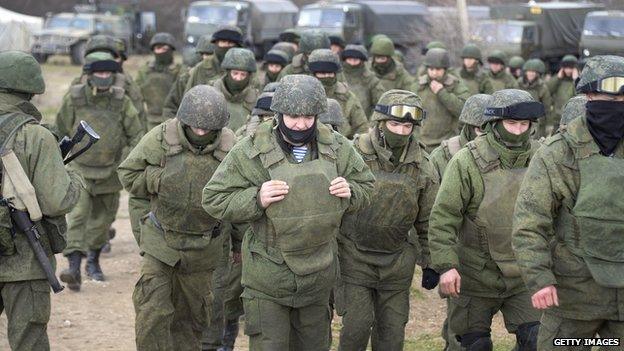Ukraine's nuclear regret?
- Published
- comments

Would nuclear weapons have deterred Russian military action in Crimea?
At least one Ukrainian politician is wondering whether his nation should have kept its nuclear arsenal after the collapse of the Soviet Union.
In 1994 the US, UK, Russia and Ukraine signed the Budapest Memorandum, in which the three powers offered assurances that they would respect Ukraine's territorial integrity. Pavlo Rizanenko, a member of the Ukrainian parliament, is having second thoughts.
"We gave up nuclear weapons because of this agreement," he told, external USA Today's Larry Copeland. "Now there's a strong sentiment in Ukraine that we made a big mistake."
Mr Rizanenko's logic is sound, writes, external USA Today's James S Robbins.
"The problem with Ukraine trading its most potent weapons for Russia's promise of good behaviour is now evident," he says.
"Kiev gave up its means of deterring Russian aggression. Now, Ukraine is overmatched in conventional forces and would have difficulty fighting off a Russian incursion."
He argues that current and future nuclear powers, such as Iran, North Korea, Japan, India and Pakistan, should take note: deterrence works.
There's a lesson for the US, as well:
For America, the message is to give up the quixotic quest for "global zero", build up missile defences and modernize the U.S. nuclear force. To live in the 21st Century, the United States will need to relearn the lessons of the 20th.
The American Interest's Walter Russell Mead agrees, external.
"If Ukraine still had its nukes, it would probably still have Crimea," he writes. "It gave up its nukes, got worthless paper guarantees, and also got an invasion from a more powerful and nuclear neighbour."
He cites Libya as another example of a nation that negotiated away its nuclear programme only to sacrifice its security.
"The choice here could not be more stark," he writes. "Keep your nukes and keep your land. Give up your nukes and get raped."
That's just not true, counters, external Gareth Evans, the former foreign minister of Australia. He says such a view has "dangerous policy implications".
"Nuclear weapons are simply not the effective deterrent that most people think, whether the context is deterring war between large nuclear-armed powers or protecting weaker states against conventional attack," he says.
An arsenal that is "suicidal to use", he argues, is not an effective deterrent. Russian President Vladimir Putin would know that Ukraine wouldn't use nuclear weapons to defend Crimea, so the outcome in that regional crisis would probably be the same today even if Ukraine were an atomic power.
Nuclear weapons are a destabilising element, he concludes, and the risks of mistaken or ill-conceived use far outweigh any benefits they may have.
As much as we like to speculate about what Ukraine as a nuclear power would do, writes, external the American Conservative's Noah Millman, the reality is that Ukraine never really had a choice.
"Western and Russian interests were aligned in wanting to see Ukraine denuclearized; an independent nuclear Ukraine would have been treated as a dangerous rogue state," he says.
As for the Libya example:
Dictators may well learn the lesson from Libya that denuclearization will not bring Western protection - which is true. It does not therefore follow that a nuclear Libya could have done anything different to defeat its insurgency.
Posing counterfactuals - what would happen today based on past actions not taken - is always a tricky business. It's a game, however, that commentators and analysts seem eager to play.